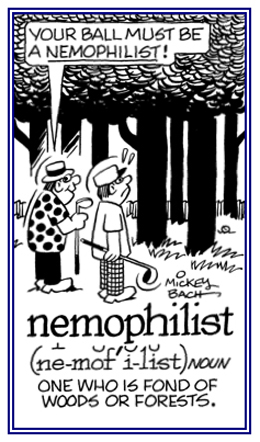philo-, phil-, -phile, -philia, -philic, -philous, -phily, -philiac, -philist, -philism
(Greek: love, loving, friendly to, fondness for, attraction to; strong tendency toward, affinity for)
These are just a few of the meanings set up for the etymological meanings of philo- which comes to us from Greek.
In biology, there are many words that use philo-, phil- to mean "thriving in such and such a place or situation; or exhibiting a tendency for a specified condition" for its existence.
Other meanings include: "strongly attracted to; such as, an organism that loves or is strongly attracted to something which is specified".
In psychology and psychiatry, -phile, -philia, etc. use this element as a word termination indicating an abnormal craving or attraction to or an affinity for an object as shown by the word stems to which they are affixed.
The circumstance of an organism living in a stream: After reading about namatophily, Ted decided to go down to the little stream and look for a frog or a salamander!
A collector of prayer rugs: On his many trips to the East, Jack thought that the small rugs the Muslims kneeled on to pray were very interesting and attractive, so he started acquiring the best ones to take home with him, and he turned out to be a namzlikophilist!
An individual who loves handkerchiefs: Jill thought that the handkerchiefs her grandmother had were absolutely beautiful, with crocheted edges and embroidery work, so she started saving the ones she liked best and her friends joined her as napcarrephilists.
A collector of naval uniforms: Ever since Joe was a boy, he was intrigued by the navy and so he decided to save the naval outfits of his ancestors that were in the navy. He found out later that he was not the only nautumephilist in the city!
necrocoleopterophilous (adjective) (not comparable)
Regarding the process of pollination by carrion beetles: The necrocoleopterophilous method of fertilization causes skunk cabbage to have a very nasty or displeasing odor.
The occurrence of fertilization by carrion beetles: After June read about necrocoleopterophily in her textbook, she understood why the skunk cabbage smelled like rotting flesh, which evidently interested pollinators.
necroentomophilous (adjective) (not comparable)
In biology, a reference to fertilization by carrion beetles: A necroentomophilous condition can take place when a carrion beetle crawls into a Sumatran corpse flower, which has a very foul smell, and without intending to, carry the pollen from its spadix to other plants of the species on their journey to find more food.
The property of pollination by carrion beetles: Mr. Black, the biology teacher, told his students about necroentomophily and asked them it they had ever seen such a beetle that fertilized a Sumatran corpse flower or a skunk cabbage.
In psychiatry, a person who is morbidly attracted to corpses; also attributed and figuratively, a morbid fancy for the dead, or for contact with dead bodies: Jack had a friend who was a necrophile and obsessed and fascinated with someone's departure, cadavers, and corpses.
necrophilic (noun), more necrophilic, most necrophilic
Descriptive of an individual who is obsessively attracted to to the dead: Nancy's friend had a necrophilic trait in her that Nancy found very macabre and dreadful.
In psychiatry, a morbid desire to be in the presence of dead bodies: In the story Sally was reading, the main character suffered from necrophilism and loved to walk in graveyards and talk to the dead bodies.
necrophilous (adjectove) (not comparable)
Referring to a preference for dead tissue or dead things: There are some necrophilous organisms, like bacteria or insects, that thrive on deceased matter.
A morbid fondness for being in the presence of dead bodies; necrophilia: Necrophily is an extremely abnormal erotic or sexual interest in corpses.
nemophilic (adjective), more nemophilic, most nemophilic
Descriptive of an individual who has a fondness for groves or small woods: Ted's neighbor certainly was a nemophilic individual who spent all of his free time either going on picnics in the forest or camping for weeks in the woodland area not too far from his home.
A person who has a special love of groves of trees: Rupert is a confirmed nemophilist and has purchased a farm with a section of birch trees on it so he can wander peacefully among them.

© ALL rights are reserved.
Go to this Word A Day Revisited Index

Go to this Word A Day Revisited Index
so you can see more Mickey Bach illustrations.
Related "love, fondness" units: agape-; amat-; vener-; venus.


